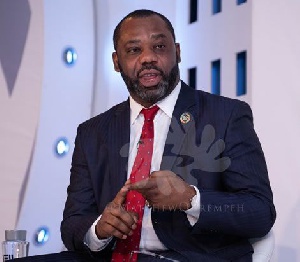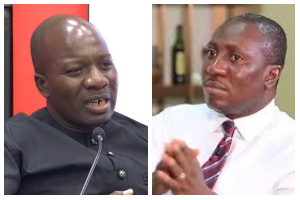“The school curriculum must be a mirror and a window for students to see themselves reflected and also see the other parts of the world and how they relate to them”-Dr. Andrew Allen
Both the governments of Ghana and Ontario-Canada have plans to introduce new elementary school curricula in the next school year that will meet the present as well as the future needs of their students.
The Doug Ford government in Ontario recently revealed significant changes to Ontario's education system, including increased intermediate and high school class sizes, new elementary math and sex-ed curricula and a province-wide ban on cellphones in the classroom. The Ontario Minister of Education Lisa Thompson took to the airwaves to explain the rationale behind the changes they seek to bring to the classroom.
"Our plan will modernize the classroom, protect the future of the education system and ensure that Ontario students will acquire the skills they need to build successful lives, families and businesses right here in Ontario," said Education Minister Lisa Thompson.
The President of the Republic of Ghana, His Excellency Nana Akufo-Addo is also quoted in the news as having said, “He is modelling Ghana’s education system to suit what pertains in advanced countries like Singapore, Finland, Canada, Japan, Korea, Malaysia among others. These countries, like Ghana, have taken steps to make education ‘free from Kindergarten to Senior High School,’” MyNewsGh.com
The President was speaking at the 109th-anniversary celebrations of the Adisadel College, Cape Coast, on Saturday, 9th March 2019.
Obviously, education is the biggest enterprise in any civilized society. Granted the fact that education is one of the most important tool for national development it becomes the responsibility of any progressive government anywhere to provide and promote sound educational policies as well as infrastructure that will help its people to acquire knowledge, skills and attitudes that enable them to develop their potentials. Any reforms to education (especially formal or classroom education) must, therefore, equip the learner with tools, skills and opportunities that enable the learner to be creative enough to fend for his/her personal needs as well as the needs of the community that will bring development to all as a whole.
Apart from the classroom teacher and educational infrastructure, the curriculum is very critical to the teaching and learning process in our schools. It is undeniable that, “A curriculum is considered the ‘heart’ of any learning institution which means that schools or universities cannot exist without a curriculum. With its importance in formal education, curriculum has become a dynamic process due to the changes that occur in our society.”
The curriculum must, therefore, be creative enough to make both the teacher and the student responsive to the needs of community, thus, preparing the student for the future. It should not only prepare the student to pass standard tests (chew, pour and forget). It must provide the learner with creative opportunities for critical thinking and problem-solving.
One of the quotes about Culturally Relevant and Responsive Pedagogy states that “Culturally responsive educators build upon the varied lived experiences of all students in order to bring the curriculum to life. Through this approach, they integrate locally situated learning into daily instruction and learning processes. . . Knowledge building is reciprocal because students play an active role in crafting and developing learning experiences for themselves and their peers. This results in making learning relevant and accessible for all students in the classroom as they are able to see themselves in the curriculum. (source: CRRP ministry monograph)
The greatest challenge we face today is relevance. Our students require a curriculum that provides them with meaningful experiences, that engenders deep and significant learning. It has to be relevant and responsive to the age in which we live. In other words, it must educate for life.
Technology keeps on changing how we live. And that, the only possession we have that keeps us going is our CREATIVITY. Students, therefore, have to take opportunities of new learning initiatives and improve upon what they have already. The job market keeps on changing. What students learn at school should, therefore, be geared towards preparing them for the needs of the community. This calls for a dynamic and relevant curriculum.
As an educator, I was happy to hear the President of the Republic of Ghana in his recent State of the Union address to the nation outline his government plans to put in place a new school curriculum at the primary school level that is relevant and pragmatic to the needs of the student and subsequent to foster national development soon. This will be a humble beginning of making the school curriculum more relevant to the needs of the changing world.
He mentioned that “In September 2019, a new standards-based curriculum will be rolled out from kindergarten to Class 6 in primary schools. This curriculum has drawn upon the best practices from all over the world and will focus on making Ghanaian children confident, innovative, creative-thinking, digitally-literate, well-rounded, patriotic citizens. Mathematics, Science, Reading, Writing and Creativity are, therefore, at the heart of this new curriculum.”
I suggest that numeracy and literacy, science and technology, visual arts and performing arts, social studies and vocational studies must all be given respectable emphasis in the development of the school curriculum to foster CREATIVITY in our schools and colleges.
In conclusion, I will like to submit that our communities are undergoing radical changes as technology advances. Schools, colleges and universities ought to acknowledge such changes and make what students study in these formal institutions of learning more relevant to the needs of the community. CREATIVITY ought to be the bedrock of any new CURRICULUM that we develop for our schools.
Opinions of Friday, 29 March 2019
Columnist: Joe Kingsley Eyiah















